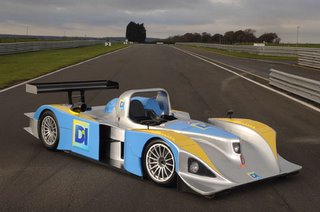D1 Oils to Test Biodiesel in Performance Race Car
 D1 Oils plc (D1), the UK-based global producer of biodiesel from renewable energy crops, is to test the performance of green diesel fuel by sponsoring the entry of a biodiesel powered car in the Le Mans global series of sports car races. The D1 Lola B2K car will be powered by a high performance diesel engine modified to run on a mix of regular diesel and biodiesel produced from vegetable oils. The objective is to test the performance, fuel efficiency and emissions produced by different biodiesel blends. The D1 car and engine are being developed for Le Mans Prototype racing by groupBio, a UK-based racing team.
D1 Oils plc (D1), the UK-based global producer of biodiesel from renewable energy crops, is to test the performance of green diesel fuel by sponsoring the entry of a biodiesel powered car in the Le Mans global series of sports car races. The D1 Lola B2K car will be powered by a high performance diesel engine modified to run on a mix of regular diesel and biodiesel produced from vegetable oils. The objective is to test the performance, fuel efficiency and emissions produced by different biodiesel blends. The D1 car and engine are being developed for Le Mans Prototype racing by groupBio, a UK-based racing team.Under the Renewable Transport Fuels Obligation (RTFO), announced by the government in November, UK garages will be required to sell diesel blended with biodiesel to a minimum level of 5% by 2010. Biodiesel produces lower emissions of pollutants and greenhouse gases than mineral diesel, and is produced from vegetable oils derived from energy crops. These absorb CO2 as they grow, making the net carbon emissions neutral. D1’s objective is to test fuel blends containing 5% (B5), 20% (B20) and 50% (B50) biodiesel, and research the performance and characteristics of biodiesel made from different vegetable oil feedstocks.
D1’s biodiesel feedstock of choice is jatropha curcas, a tree that grows in Africa, South East Asia and India. Jatropha seeds produce a high yield of vegetable oil that can be refined into biodiesel. Unlike other biodiesel feedstocks, such as rapeseed, soy and palm, which require arable land to produce economic yields, jatropha grows on waste and marginal land and its planting will not displace essential food crops in developing countries.
“This is about demonstrating that low emissions don’t mean low performance,” said Philip Wood, CEO of D1. “We are entering a biodiesel car for Le Mans prototype racing because endurance events offer the best opportunity to test and improve the characteristics of this new green fuel. What we learn about how different biodiesel blends perform in our engine is going to be of immense value to biodiesel feedstock producers and refiners, to car and engine manufacturers and to motorists who want to know that biodiesel will get them the mileage and performance they need while contributing less to global warming. It also offers a strong opportunity to build the D1 brand as we expand our planting and refining business globally.”








0 Comments:
Post a Comment
<< Home